Tags
"international travel"
LBPA Bacteria Lab at ENS Cachan: Kerry Jones, Winter Shadow 2016
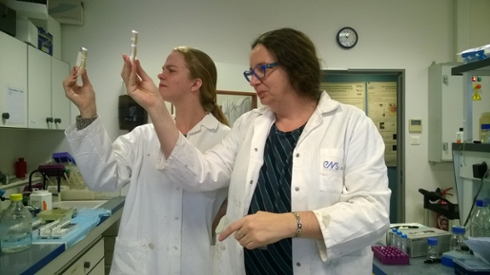
Imagine you’re me. You’re 20 years old and you love DNA, but have very little on your resume to show for it, save a former lab tech job and a prayer that your future employer can detect your enthusiasm. You’re dragging a conspicuously neon suitcase down the street of a Parisian suburb following the signs to École Normale Supérieure de Cachan, a private University with a reputation for its scientific prestige. Not surprisingly, your three days of 1990s-era in-car-insta-French CDs have done nothing to prepare you for the conversation with the security guard explaining what you’re doing there. For the next two weeks, you’ll be having these conversations with everyone you meet by courtesy of the immediate observation that you are out of your element. Your comfort zone is 6667 km away, and you are really excited not to be in it.
For my Winter Shadow Internship, I was working under the supervision of Bianca Sclavi, a biophysicist in charge of the Bacteria Lab at ENS Cachan. Suffice it to say that my Winter Shadow experience was a learning opportunity, but also an experience of exposure on many counts.
LBPA is an interdisciplinary lab, so projects not only pass through the hands of biologists, but chemists, mathematicians, and physicists as well. In addition, Bianca often seeks the assistance of collaborators around the world from Minneapolis to Cambridge to other side of Paris. Coming from Reed, where the Bio Department and the Physics Department ironically feel miles away from one other, this was one of the first surprises about LBPA: how scientific inquiry in its raw form refused to stay in one place. With this in mind, as well as Bianca’s tendency to work on multiple things at once, it was often easiest to follow the development of individual experiments.
Continue reading LBPA Bacteria Lab at ENS Cachan: Kerry Jones, Winter Shadow 2016
Alternative Mental Health Care, India: Savanah Walseth, Winter Fellowship for International Travel 2015

Savanah Walseth, junior Sociology major and recipient of the Winter Fellowship for International Travel, reflects on her time in India, exploring alternative models of mental health care.
My trip to India was a series of dichotomies. Anxiety about traveling to a country alone; pure joy in discovering things that only I would have found. Seeing some of the most fabulous beaches and most expensive buildings in the world; visiting the largest slum in Asia. Exhaustion from constant conversations about money and worry about theft; witnessing immense kindness from complete strangers. I was there to study mental health in the country and while I did this, I also learned a lot about my own.
I think the only way to sum up my trip is to take it one city at a time and share the lessons learn and a few tidbits about the people I met and things I saw.
Continue reading Alternative Mental Health Care, India: Savanah Walseth, Winter Fellowship for International Travel 2015
Ukrainian Language in Lviv: Isabel Meigs, Winter Fellowship for International Travel 2015

Isabel Meigs, senior Russian major and recipient of the Winter Fellowship for International Travel, reflects on her time in Ukraine, studying Ukrainian language and culture.
On the Sunday in between my two weeks of language instruction, I went on an excursion called “Karpatskii Tramvai + SPA”. The tour left at eight in the morning from the Hotel L’viv in a Mercedes mini-bus and drove three or so hours south of L’viv into the Ivano-Frankivsk oblast and the Carpathian Mountains. Our tour guide’s name was Yurii. Besides myself, there was a young couple whose common language (but neither of their native languages) was English, a mother/five-year-old son pair, a mother/teenage daughter pair, and a whole group of middle-aged friends from Dnipropetrovsk. And a French bulldog wearing a camo jacket.

Continue reading Ukrainian Language in Lviv: Isabel Meigs, Winter Fellowship for International Travel 2015
My Teacher: Tai Chi in China, Ian Connelly, Winter Fellowship for International Travel 2015

Ian Connelly, senior Chinese major and recipient of the Winter Fellowship for International Travel, reflects on his time in Beijing, China, practicing Tai Chi.
++++++++++++++++
My teacher’s name is Zhong Zhenshan. He comes from Handan in Hebei province, about 5 hours south of Beijing. He began studying taijiquan with his master Yao Jizu when he was thirteen years old and now he is one of the foremost lineage holders of Wu family style. He’s participated in many competitions, symposiums, and exhibitions both domestically and internationally and he has students all over the world.
Continue reading My Teacher: Tai Chi in China, Ian Connelly, Winter Fellowship for International Travel 2015
Lumnicenter Lighting, Brazil: Nate MacFadden, Winter Shadow 2016

In January of 2016 I traveled to Curitiba, Brazil, for a winter shadow at Lumicenter Lighting, an LED lighting company. Immediately after leaving Boston on my plane to Brazil, I felt a mixture and excitement and anxiety: I did not speak Portuguese, had never been to South America, and was going to be doing some challenging engineering. However, as I met my host family I learned that my nerves were for naught. The family I stayed with was warm and inviting. They gave me some of the best home cooking I've had (somehow making healthy food taste really good), and showed me around like I was one of their close friends. They took me to beautiful parks, cities by the coast, drove by the tropical rain forest, went to excellent restaurants, and went go-carting. The most memorable meal for me there was at a churrascaria restaurant. It is a type of all-you-can-eat barbeque with every preparation of beef and pork you could want. I generally graze on food, eating many meals but always small in portions, but here I rarely said no when offered a cut of meat.
Once at the actual company, I was greeted by staff members with whom, once we learned how to get over the language barrier, we immediately started having fun and teasing each other, all while working on a better heating solution for a LED driver. The heat had to be reduced because the higher temperature an electrical component is, the shorter its lifetime. Even if the component is within its safe operating temperature range, being near the top of that range causes the product to break significantly earlier. Many methods were already tested so I had the challenge of coming up with new methods to hopefully be applied either in conjunction with the previous methods or by themselves. The staff made sure to give me feedback on my ideas and helped me every step of the prototyping way. They also knew that nobody could work on an empty stomach, so they introduced me to a snack called Paçoquita which I ended up loving. It was basically crushed nuts and sugar pressed into little cylinders and it was fantastic.
I'm going to miss everything from my trip: the people, the food, the weather, the work... I'll be sure to visit again soon.
Continue reading Lumnicenter Lighting, Brazil: Nate MacFadden, Winter Shadow 2016
ASTRON Institute: Irene Globus-Harris, Winter Fellowship for International Travel

Westerbork
Irene Globus-Harris, sophomore physics major and recipient of the Winter Fellowship for International Travel, reflects on her time in Dwingeloo, the Netherlands, at ASTRON, the Netherlands Institute for Radio Astronomy.
++++++++++++++
The Dutch national color is orange. Bright orange, the type that hurts your eyes after staring at it too long. As I flew in at the break of dawn, the entire sky—awash in an intense, orange sunrise—seemed to reflect that fact. I spent the first few days visiting my host family and friends in North Holland, then headed to Dwingeloo to begin my work at ASTRON. Dwingeloo is small—more of a village than a town, and is adjacent to one of the Netherlands’ largest national parks, the Dwingelderveld. ASTRON itself sits within that national park which made the bike ride in exceptionally beautiful.
Presidents Summer Fellowship, Connecting to Armenian Artists Part 3, Knar Hovakimyan
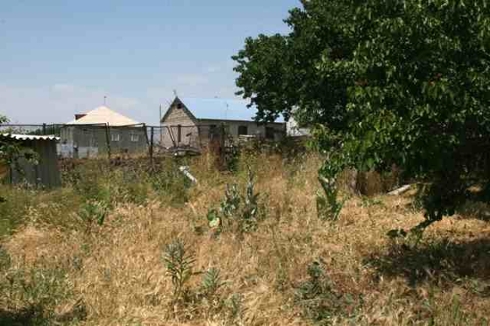
Let's talk translation.
I was really surprised to find that the most difficult part of the translation process was reading the poems. This task seemed easiest at first, but when I actually set out to produce a literal translation of a poem, I found myself completely lost. For a while I thought that my Armenian language skills were just not up to par, but I soon realized that the difficulty was not in understanding the meaning of the words, but uncovering their role within the line and within the whole poem. I had to think deeply about what the author of the poem intended with each word since soon I would become the author of the translation, and ideally I would have the same intentions. So the first step was deep reading and analysis to produce a literal translation.
Continue reading Presidents Summer Fellowship, Connecting to Armenian Artists Part 3, Knar Hovakimyan
Presidents Summer Fellowship, Nanofluids and Gene Mapping Part 3, Abrar Abidi

For his President's Summer Fellowship, Abrar Abidi ’16, physics major is working in a lab at McGill University in Canada, helping to develop new nanofluid technology to improve DNA mapping methods. Read on for his third and final blog installment:
Since leaving Montreal at the end of August, I’ve thought back many times to that day I walked through the old city and down to the port. There, in the Fleuve Saint-Laurent, which flows down to the Great Lakes, lies the small Île Sainte-Hélène. And on the other side of this island, half-concealed by a line of trees, is a structure that looks like it came from another planet. Two hundred feet high, and webbed with steel beams and acrylic panels in the shape of a globe, this exotic building disorients anyone that sees it. It is, of course, the Montreal Biosphere, built a half-century ago by Buckminster Fuller for Expo 67, the most successful world’s fair of the 20th century. In its time, when so many countries were riven by wars and paranoia, Expo 67 offered the world a brief remove from the painful past and shameful present—it offered what the world most craved: an optimistic vision for the future.
My grandfather, who died three years ago, was among the 50 million people who attended Expo 67. The son of a radio repairman in India, he grew up in modest circumstances and struggled to secure himself an education at the only university for Muslims in India. He rose, quickly, to the top of his class, and won a scholarship to come to the US where he began graduate studies in civil engineering at Harvard. Soon after his degree my grandfather returned to what was by then Pakistan, where six of his ten siblings shared two small, adjacent rooms. He worked intensely so he could support and provide a good education to his brothers and sisters. That generation of the Abidi family, though small in number now, all went on to find success in their individual careers, and passed on my grandfather’s tradition of hard work and education to the Abidis of my parents’ generation.
Presidents Summer Fellowship, Art Therapy in Italy Part 3, Margaret MacLean
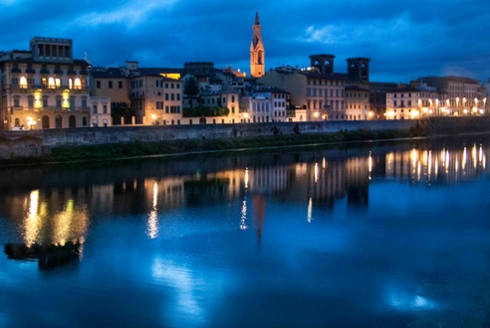
President's Summer Fellow Margaret MacLean '16, studio art major, is leading art classes for youth with intellectual and developmental challenges at the Cooperativa Barberi in Florence, Italy. Read on for the third installment of her adventures:
It is so strange to be back in Portland away from the hustle and bustle of Florence. I realize that I felt very big in Florence in a wide-clunky-taking-up-space sort of way. Biking to work or class I was constantly dodging tourists, locals, and dogs on narrow streets. Coffee is served in the smallest of cups. Kitchen appliances are tiny. Doorways are smaller than in the US, chairs and tables are lower, and there is always a stranger’s elbow to accidentally bump into. Being back in Portland I feel like I have space to breathe, but I still miss the chaos.
Presidents Summer Fellowship 2015: Haley Tilt, Visual Memory and Livy, Part 2
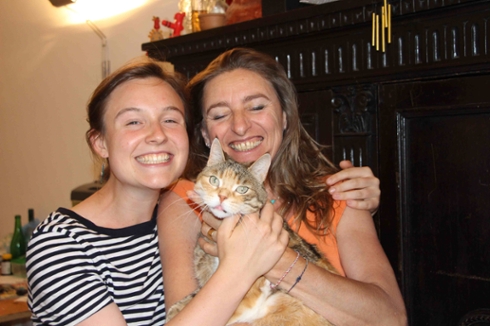
Haley Tilt, '16, Classics, is adventuring in Rome, tracing and chronicling the geography described by the ancient historian Livy. She plans to create a virtual, interactive map of ancient Rome, based on Livy's depictions.
My last weeks in Rome were glorious. Finally comfortable with the city, I decided it was time to venture out into the other, more remote places Livy discusses. One of these places was the town of Veio, forty minutes North of Rome by car, two or more hours by bus.
On the rolling hills above Veio sleep the remains of Veii, the jewel of ancient Etruscan cities. Now a national park, Veii offers little to a casual tourist group. Once immense, the only area of the city now accessible to visitors is a reconstruction of a temple complex dedicated to Apollo. It’s beautiful, but not what I’m looking for. I’m searching for the cittadella, the citadel of Veii, and the seat of the symbolic power Veii held for Livy. The maps I’m accustomed to in US parks never manifest, so I’m left asking the few locals walking their dogs if they know what I’m looking for. No, they tell me, they don’t know where the cittadella is. Finally I find a woman sitting beside a waterfall, and when I ask her my question, she responds to me in perfect English, peppered with a funny combination of Italian and British sounds. Yes, she knows where it is, and she gives me detailed directions, which I will later botch completely, wandering through the hidden parts of the park. She even knows a version of Veii’s defeat by Rome, decidedly different from the version in Livy.
Presidents Summer Fellowship - Art in Italy - Margaret MacLean - Part 2
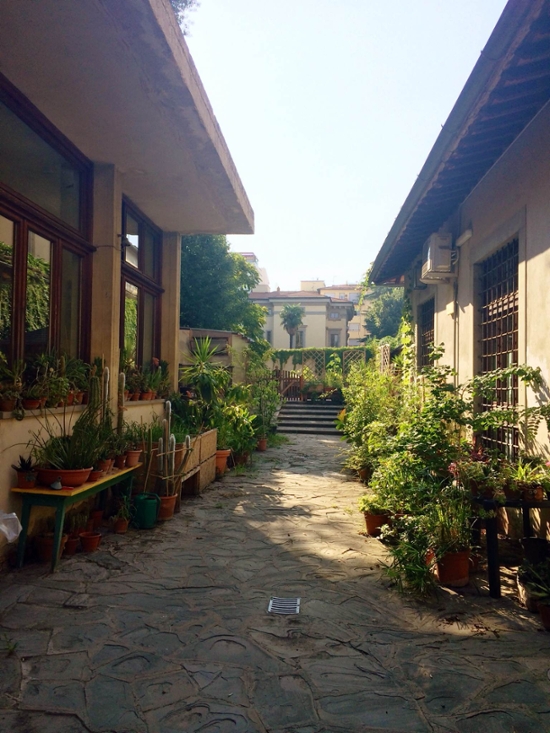
The beautiful Cooperativa Barberi.
President's Summer Fellow Margaret MacLean '16, studio art major, is leading art classes for youth with intellectual and developmental challenges at the Cooperativa Barberi in Florence, Italy. Read on for her adventures:
The hardest part of my PSF experience so far has been wrestling with my expectations. The dreaming and planning I did to prepare for Italy was incredibly important but also left me with some lofty ideas about what my summer would look like. My views on all of the things I came here for have shifted. My project has taken a slightly new shape and is far less sparkly and neat than it was in my imagination. I suppose this is to be expected!
First of all, my relationship towards my photography has changed. Usually I feel like my camera gives me the power to enter into spaces and situations that I couldn’t ordinarily. As photographer Diane Arbus said, “the camera is a kind of a license” that allows you to ask more questions and look more carefully than is usually socially acceptable. But in Florence during peak tourist season, with a camera in hand I feel like a tourist, not an artist. When I click the shutter button I feel like I am a part of a tourist culture that takes-takes-takes and gives nothing back. Italy’s biggest industry is tourism and in Florence so many things are constructed purely for tourists to experience and photograph. I don’t know if what I am feeling is genuinely a dislike for this exploitative aspect of photography or simply a form of artistic self-consciousness. Probably a bit of both.
Presidents Summer Fellowship, Art in Italy, Margaret MacLean
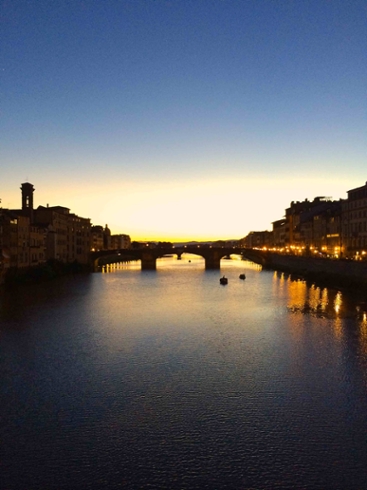
President's Summer Fellow Margaret MacLean, '16, studio art major, is leading art classes for youth with intellectual and developmental challenges at the Cooperativa Barberi in Florence, Italy. Read on for her adventures:
Today I ran down an “up” escalator with my stomach full of mozzarella and espresso. Honestly, this is a pretty good metaphor for how the last month and a half has been for me in Italy: exhilarating, frustrating, accompanied by plenty of moving backwards, and success only after a big leap of faith. And always after eating a little more than I thought I could!
The weather in Florence is almost unbearably hot and humid but I am getting used to it. I spend my mornings in Italian class and my afternoons volunteering in art therapy or exploring the city. I drink at least two espresso a day, speak only Italian at home, and I am slowly cooking my way through a Tuscan cookbook. I work in the garden with my host nonna (grandmother). I practice my landscape sketching on the banks of the Arno and in various piazze (plazas) around the city. When I get homesick and/or overheated I watch American movies dubbed in Italian at the foreign movie theatre. I am loving my volunteer work, my students, and the new friends I have made here.
Continue reading Presidents Summer Fellowship, Art in Italy, Margaret MacLean
Presidents Summer Fellowship, Connecting to Armenian Artists, Knar Hovakimyan

Working on the ground in Armenia, President’s Summer Fellow Knar Hovakimyan ’16, linguistics major, seeks to introduce Armenian literature to English-speaking communities through poetry translation
I spent a month at home panicking over how I would get in touch with poets, adjust to their schedules, and meet them each a couple times in Armenia. When I got to Armenia, I quickly realized that I was going about things the American way – here, it is not necessary to make plans weeks in advance, confirm, reschedule... You can just show up at someone's house and they'll have a table set in five minutes. My first day here I made a phone call to a poet, Tigran Paskevichyan; after introductions we arranged to meet later that same day at Artbridge, a cafe he frequents. The entire encounter felt like a scene from a movie. The waiter brought out the poet's usual Armenian coffee, which Paskevichyan enjoyed with a cigarette as we talked about my project; we discussed his influences ranging from Daniil Kharms to Saul Leiter and his intentions behind specific poems – before I left home, I was worried about how far my Armenian language skills would take me, but luckily, I managed to keep up the conversation. With a signed copy of his book in hand and some new poems to work on, I embarked on the hectic week ahead of me.

Presidents Summer Fellowship 2015: Haley Tilt, Visual Memory and Livy
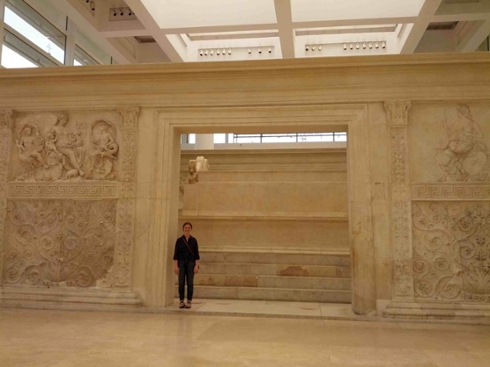
Right now I’m sitting at the kitchen table in a warm and eclectic apartment in Rome. The last two weeks have been a whirlwind of travel, stilted but enthusiastic conversations, and incredible museums. Most of all, my two weeks in Rome have seen me dogging the footsteps of one of the most influential and prolific historians of the ancient world. My project is founded on the idea that Livy is doing something special with space in his histories, setting stories in places that are highly specific and would have been familiar to his contemporaries. Like the ancient rhetorical technique of the memory palace, Livy capitalizes on the visual memory of his readers. Also like the memory palace, Livy’s stories imprint themselves on the spaces they occupy. After reading a particularly grisly passage, in which Tullia drives her chariot over her father’s corpse, the location of which, Livy informs us, is “as far as the top of the Cyprius Vicus, where the temple of Diana lately stood… to the right on the Urbius Clivus, to get to the Esquiline,” a reader will thereafter recall that spot as the scene at which his anecdote took place. My goal has been to hunt these places down, to photograph them, and to plot them on a digital, interactive map, so that modern readers might better understand this aspect of Livy’s text.
What I’ve found is a city that has been profoundly altered. Of course I knew that this would be the case; many of the monuments Livy discusses are now fragmentary and some are gone entirely. Many once-open spaces are now densely packed with buildings.
I knew that this would be the case, and I even welcomed the opportunity to engage with the modern city the same way Livy did--by countering absence with remembrance. In the example above, Livy recalls that the temple of Diana “lately” was standing. Present in his readers’ memories, but absent from their physical world, the temple (and so many other spaces altered by the Augustan building program), have become another level of Rome’s historical and topographical memory.
Winter Fellowship for International Travel: Emmeline Hill
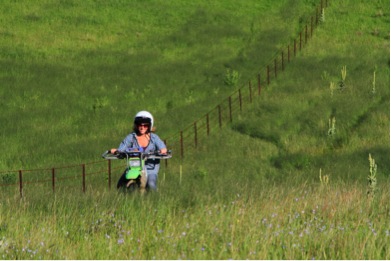
Emmeline Hill, senior biology major, traveled to Australia on a Reed Winter Fellowship for International Travel. The following post describes her experience getting to know the insects and sheep of the island continent.
“You haven’t seen a funnel web yet? Ah, if you like critters, we have to find one. You can just tell they’re predatory when you look at them.”
Thus began my tour through the garden of a friend of my host family on a search for Australia’s most deadly spider. We spent a good 20 minutes tramping barefoot through the dead leaves and branches littering the yard. As we went, Jon turned over various rocks and boards and investigated different crannies, hoping to come upon a funnel web spider. There are several species of funnel webs in Australia, six of which are severely venomous to humans (though there have been no known deaths since the development of an anti-venom in 1981). I’m still not sure if I am disappointed or relieved that no funnel webs decided to make an appearance.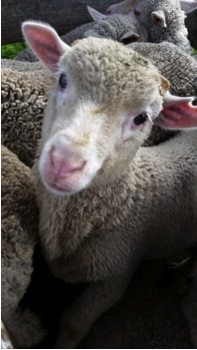
Before I left on my trip, countless people warned me about dangerous spider this and poisonous snake that, don’t go in the ocean and be careful in tall grass. But after a very short time in Australia I learned worrying about every potential threat was a waste of time (though I did check under my bed each night for Huntsman spiders, not because they are dangerous but because I didn’t want to wake up with one on my face). In Australia you don’t run away, you don’t say no because of the vague possibility of danger, you go searching for funnel web spiders, and you poke blue tongued lizards, and you back the truck up to get a second look at the red bellied black snake. I did my best to adopt this philosophy of not saying no. Even when I was exhausted or nervous, if a new opportunity was offered to me, I took it.
For the duration of my trip, I stayed with the Taylor family in the tiny town of Kentucky, New South Wales, on the 1,000-acre sheep farm that has been in the family for six generations. Currently, three generations of family live on the property together, creating a vibrant community of artists, intellectuals, and adventurers, each family member more often than not encompassing all three of those descriptors. I was on the farm as a helper; in exchange for room and board I worked 4-8 hours a day. No two days on the farm were the same, some days I herded sheep from one paddock to another, other days I set to work removing an invasive species of thistle, and sometimes I supervised the kids who almost exclusively wanted to play cards.
Continue reading Winter Fellowship for International Travel: Emmeline Hill
Argentinian Spanish in Buenos Aires: Winter Fellowship for International Travel, Cristobal Mancillas

Cristobal Mancillas, junior political science major and recipient of the Winter Fellowship for International Travel, reflects on his time in Buenos Aires, Argentina, studying Argentinian Spanish
I spent my winter travel fellowship in the beautiful city of Buenos Aires, Argentina. I received private Spanish instructions from professor Susana. The focus was on building conversational fluidity and learning an Argentinian dialect of Spanish. Professor Susana was a compassionate and caring individual who helped me adjust to a new place, a new language, and a new way of life. We spent time discussing art in the park of memory, dedicated to the memory of those who lost their lives in the Argentinian Dirty War, receiving an unofficial and spontaneous private tour of the Argentinian national bank, and relaxing while eating choripan at a nature reserve in Puerto Madero. While I could endlessly recount the amazing experiences I had in Buenos Aires, I feel that it was also the not so rosy experiences that allowed me the tremendous opportunity to grow.
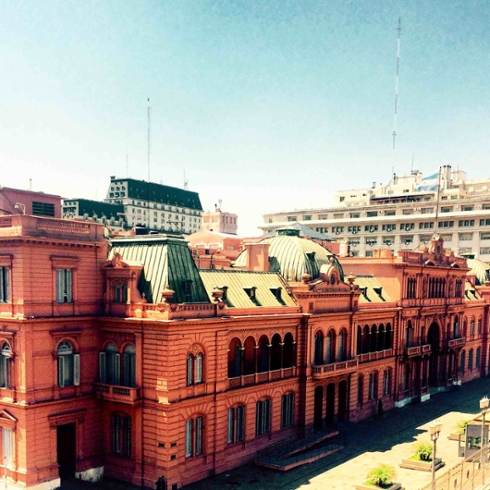
Continue reading Argentinian Spanish in Buenos Aires: Winter Fellowship for International Travel, Cristobal Mancillas
Research: Pictures Big and Small, President's Summer Fellowship Final Reflection, John Young
There is something deeply rewarding about setting up a plan and then executing it. Thought the “heist” metaphor was perhaps a stretch, and though I would never want to implicate myself or my colleagues in “theft” (--though, my brief walk through the British Museum suggested to me that historians, archeologists, and anthropologists have perhaps done their fare share of that, under different names--), finding what I was looking for where I looked for it was a satisfying experience.
What was I looking for? And what did I find? I was looking for the correspondence of Robert Swinhoe relating to Natural History. His “day job” as it were was as a diplomat in the British Foreign Service, and he produced volumes of material related to his work in the consulate. I wasn’t incredibly interested in all of that work, however, and I wasn’t sure what, if anything, I would find in his diplomatic writings with respect to his natural historical work. I did manage to locate all of his archived diplomatic writing. The day after arriving in London I went to the National Archives and spent the morning and afternoon browsing microfilmed catalogues of Foreign Service Office material, looking for things that Swinhoe produced. I spent the whole of Saturday and Sunday at the National Archives—it was the only one open over the weekend.
I had planned to do the archival work here over my first weekend because, although of lesser importance to my overall research interests, it would give me the opportunity to “practice” doing the work of a historical researcher.
Continue reading Research: Pictures Big and Small, President's Summer Fellowship Final Reflection, John Young
You Are Not A Fish: Winter Fellowship For International Travel, Reid Bondurant

Reed Winter Fellowship for International Travel recipient Reid Bondurant, senior biology major, traveled to Tel Aviv, Israel to explore an awareness-inspiring style of dance known as “Gaga”
Economics in Cape Town: McGill Lawrence Internship Award, Sarah Brauner
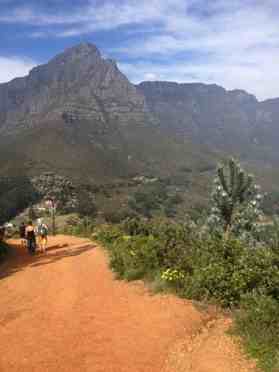
Sarah Brauner, junior economics/mathematics major, received a McGill Lawrence Internship award to spend her summer in Cape Town, South Africa working at the Economic Policy Research Institute.
This summer has been a story of disparate images and experiences, and as I sit down to write this post, its hard not to be daunted by the task of stringing them together into a cohesive narrative. In fact, the more I reflect, the more it seems that the thread holding all that I wish to convey together is a series of sharp contrasts that I have borne witness to, participated in, and attempted—with mixed success—to process.
The backdrop for all this—Cape Town, South Africa—is in some ways one of the most beautiful places I have ever been. Table Mountain, one of the Seven Wonders of the World, is visible from almost every vantage point in the metropolitan area, and beaches (apparently the setting for Shark Week) surround the city. Eucalyptus and palm trees, British-colonial architecture, striking panoramas and even Baboons, abound.
The Birth of a New Life: Davis Project for Peace, Emmanuel Enemchukwu
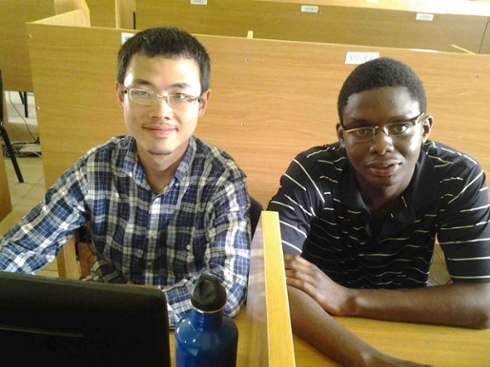
Emmanuel Enemchukwu, junior economics major, was a recipient of the Davis Project for Peace award. The following post contains his experiences implementing his project in Nigeria at the Federal Government Academy.
About half a year now separates me from the time I spent at the Federal Government Academy (FGA) Suleja Nigeria. At FGA Suleja, I executed the Davis project for peace with my colleague, Zhe Li. FGA Suleja, Nigeria, was my alma mater, and its contribution to my moral and intellectual development leaves me forever indebted to it. As such, it was with great zeal that I embarked on the project hoping to contribute the most possible in the small but relevant opportunity that I had been afforded.
The Federal Government Academy Suleja is located in one of the most southern regions of Northern Nigeria. Suleja with its beautiful hills is a town in harmony with itself and its surroundings, but this harmony seems fragile in the face of the current ethno-social turmoil perpetrated by Boko-Haram in North-Eastern Nigeria, a region of close proximity. Once in a while, the scourge of the much-reviled Boko-Haram breaks out of its enclosure in North Eastern Nigeria and into the area of Suleja. But beyond this fear of conflict, we saw peace and prosperity in a school that boasts of some of Nigeria’s smartest young minds. We define peace, with regards to the secondary school students, as the existence of social innovation and an infrastructural platform for students to optimize their academic growth potentials in a violence-free environment.
